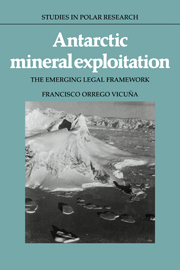Book contents
- Frontmatter
- Contents
- Preface
- Acknowledgement
- Abbreviations
- Part I The international legal framework of Antarctic co-operation and the development of resources
- Part II Alternative approaches to the conservation and development of Antarctic minerals: the process of internal accommodation
- Part III Issues and options relating to the external accommodation
- 9 Participation of States other than the Consultative Parties in the Antarctic Treaty system
- 10 The Antarctic Treaty system and the international community
- 11 Conclusions
- Appendix 1 The Antarctic Treaty
- Appendix 2 Table of signatures and ratifications
- Table of Cases
- Table of Statutes and national legislation
- Table of Treaties
- Bibliography
- Index
11 - Conclusions
Published online by Cambridge University Press: 04 November 2009
- Frontmatter
- Contents
- Preface
- Acknowledgement
- Abbreviations
- Part I The international legal framework of Antarctic co-operation and the development of resources
- Part II Alternative approaches to the conservation and development of Antarctic minerals: the process of internal accommodation
- Part III Issues and options relating to the external accommodation
- 9 Participation of States other than the Consultative Parties in the Antarctic Treaty system
- 10 The Antarctic Treaty system and the international community
- 11 Conclusions
- Appendix 1 The Antarctic Treaty
- Appendix 2 Table of signatures and ratifications
- Table of Cases
- Table of Statutes and national legislation
- Table of Treaties
- Bibliography
- Index
Summary
A trend clearly emerging from the evolution of the Antarctic Treaty System and its historical background is the strengthening of the process of international co-operation in Antarctica. While the development of this process has been characterized by a slow pace during the first twenty-five years since the 1959 Treaty came into force, there has been a recent acceleration of that pace and it can only be expected that further and quicker developments will take place in the near future.
Co-operation in the Antarctic has gained, firstly, in intensity. The rather simple approach of the 1959 Antarctic Treaty and early recommendations has given place to more elaborate mechanisms in recent recommendations and, above all, in the conventions that have come to supplement the initial framework of co-operation. Greater availability of instruments and procedures has accompanied this aspect of the unfolding process of co-operation, for which purpose the Treaty system has relied on some elements of flexibility arising from the Law of Treaties and from the practice of international organizations relating to the approval, entry into force and legal effects of resolutions and other instruments. This process has also gained in extension, as can be measured by the growing number of subjects covered by various forms of co-operation and by the larger number of States acceding to the Treaty system and related instruments or becoming engaged in active work in the Antarctic.
- Type
- Chapter
- Information
- Antarctic Mineral ExploitationThe Emerging Legal Framework, pp. 519 - 526Publisher: Cambridge University PressPrint publication year: 1988



